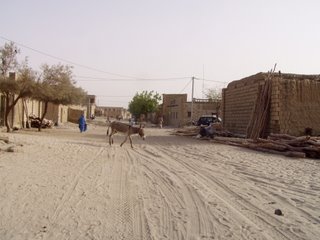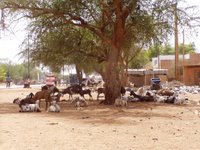
Early in the morning I managed to arrange a ride with an aid of a businessman. The price was rather high, but an eighth of yesterdays price, so relatively ok. At the moment of departure the businessman did not want to take me on his car as he said he was not public transport. Fortunately one of the boatworkers knew him and managed to convince him I was good people. His reluctance to take me, I was not able to overcome and he dropped me at the ultimate south of the city. Although it was before 7 it already started to warm up. I wanted to see the city anyway and now I was forced to, so what am I complaining about? The city was crowded with police, army and predominantly white 4x4 cars. Timbuctu happened to host a big African summit. Khadaffi also was giving acte the presence, which apparantly was felt as a big thing. Everywhere in the city were posters with Khadaffi, banners welcoming him as the great African leader. Loads of people were wearing t-shirts with a picture of Khadaffi and many children had Lybian banknotes, which the Lybians had been handing out.
Another consequence of the summit was that much of the accomodation was taken, also the one I had planned to visit. Fortunately I met someone who happened to be at hotel Sahara Passion and, what a coincidence, still had a room available. At that time I already had been roaming through the famous city for 3 hours, because no one had known my prefered sleeping place, so I agreed to go with him. The place was actualy quite nice. I decided to stay for a night and decide further the next day. First I took a short but much needed shower, it had been more than a week since I took one. As my money supply was in desparate need of replanishment, I textmessaged my brother if he could send me some money via Western Union. Taco came quick to the rescue and after some messages back and forth all was arranged. When I arrived at the bank, at the very south of the town, it should have been closed for a couple of hours already. This time the African way was to my advantage. I managed to retrieve my much needed cfas in the dying seconds of the extended opening hours. Later that day, when the sun was a little bit less hot, I managed to find some energy to explore more of the city, but most I had already seen in the morning. The city did not succeed in enchanting me, it is like mopti, djenne and all those little villages we passed on the river a lot of mud stacked up. In Timbuctu even the people are less friendly, they are realy accustomed to tourists. Especcialy the children are very anoying. Their standard reportoire goes like this: Monsieur, cava? Donne m'un cadeau. The best reaction is no reaction, then they will usually go away in 1 minute. When you feel you can't be so blunt and do respond, it can happen they will only go away when you go into a shop for a while.
The next day I decided I had seen enough of the once great and powerfull city and would leave for Gao. I was lucky and met a guy who would take me, we only had to wait a few moments for the wife of the boss as she was doing some last minute shopping. Ofcourse this was not done in a few minutes, women are the same everywhere, give them some money and they will not return in hours. When finally the woman returned with her hard bargained newly acquired stuff, again the boss of the car did not want to take me and this time there was no one to convince him otherwise. This was particularly bad as by the time the wife returned several hours had passed and many of the 4x4's had already left Timbuctu. My only chance was the bus station. To my luck they assured me that definitely a car would leave for Gao, departure time unknown. Nothing to do but wait until enough people showed up to go. After 4 hours the guy came back to me, to excuse him, the car would not leave today. If I wanted I could go in the back of a truck on top of the cargo. The truck would go to Douentza. From an old geezer sitting next to me I learned that was not a bad direction as it was on the road from Bamako to Gao. I climbed on the truck to find about 10 fellow travellers.

At first is was quite comfortable, but after about 20 km the truck was filled up with empty oil drums, which are much less soft then ricebags, we were previously sitting on. The drums were not the worst though, it was the big spare truckradiator bumping to the back of my head with every hole in the road that got to me. Halfway Douentza something in the steeringhouse of the truck broke. If it was because we hit a concrete pole or that we hit it after it broke, fact was that we had to stop. Chauffeurs are quite resourceful in Africa and after half an hour the problem was solved and we could move again. After an hour something had to be tighted on the steering, but we did not run in any problems afterwards. At 1:30 we arrived at Douentza, where I tried to sleep by the road until one of the busses arrived. I did not catch any sleep as the first bus arrived within the hour. They still had plenty of place, although it has by definition more space than a bus of the same size in Holland. E.g. in one row are 5 chairs, 3 left and 2 right from the aisle. At 9 in the morning we arrived in Gao.
The truckbus to Niamey was to leave the same day in just one hour. I decided to take it, who knows when the next one would go. I had been in crowded transports before, but this was definite a new personal record. The compartment was long full when they kept on pooring passengers in. The strategy was, see a spot that is not a head and let your self down until you touch something hard. I thought I had taken a good spot at the door, at least some space for my legs and a window I could stick my arm through. Before we left, my legspace was annihilated with cans with water and my armspace turned out to be annoying as I now had no way of resting my had anywhere.
At the beginning we were making good progress and I hoped I would be in Niamey in the evening. This changed dramatically when we reached Labaganza. There the piste ended and the driver had to find his own way to the Malinese side of the border. Average speed dropped to about 20 km/h. The Nigerien side was even worse, often at a speed below walking pace we conquered holes and bumps. I was the only white guy on the bus, consequently the whole bus had to wait for me at the Nigerien side of the border. Local people do not need a visa, I do. Although I already had mine and the driver tried to speed things up with the customs it took a considerable amount of time. The people did not seem to mind though, time is something they have plenty of. After second passport control the road improved, I should say there was a road again and at 4:00 we arrived in Niamey. I decided to sleep in the street, I had no clue where I was and where I should go.
 Although Niamey was described to me as a dump, I was impressed by its looks. Not that it is beautiful or has (many) touristic sites, but it looks relatively well organized, has a lot of asphalt roads and even some tall buildings and places with street lightings. I believe in the seventies uranium was found in the north of Niger and with prices sky high, money was available in abundance. From these times stem the fancy looking big buildings. When uranium price plummeted the country all of a sudden was poor as a church rat. I wonder what the country would have looked like if they had spent their money on education and irrigation projects?
Although Niamey was described to me as a dump, I was impressed by its looks. Not that it is beautiful or has (many) touristic sites, but it looks relatively well organized, has a lot of asphalt roads and even some tall buildings and places with street lightings. I believe in the seventies uranium was found in the north of Niger and with prices sky high, money was available in abundance. From these times stem the fancy looking big buildings. When uranium price plummeted the country all of a sudden was poor as a church rat. I wonder what the country would have looked like if they had spent their money on education and irrigation projects? Still Niamey has friendly inhabitants and I have enjoyed myself, I wish it would be a little bit less hot, today temperature rose to 47 Celsius, they said. I staid in the case de passage of the Deutsche Entwicklung Dienst(?)(DED). The previous week there had been a gathering of all DED staff in Niger. Thorsten, still was there, awaiting the arrival of his girl-friend and 2 friends. Thorsten was so nice to take me to good spots to eat in the evening and took me with him when visiting his friends in Niamey. He even arranged a place for me to stay in Agadez with a colleague, Anne. In Niamey a lot of Embassies are present so I made an embassy tour to find out my options for traveling further. Lybia only gave visa to local people; Algeria said their consulate in Agadez managed overland border crossings into Algeria and maybe they would allow me one; Chad was no problem but on the same day a civil war broke out! I did not want to go south so my only option was to go north to Agadez.
Still Niamey has friendly inhabitants and I have enjoyed myself, I wish it would be a little bit less hot, today temperature rose to 47 Celsius, they said. I staid in the case de passage of the Deutsche Entwicklung Dienst(?)(DED). The previous week there had been a gathering of all DED staff in Niger. Thorsten, still was there, awaiting the arrival of his girl-friend and 2 friends. Thorsten was so nice to take me to good spots to eat in the evening and took me with him when visiting his friends in Niamey. He even arranged a place for me to stay in Agadez with a colleague, Anne. In Niamey a lot of Embassies are present so I made an embassy tour to find out my options for traveling further. Lybia only gave visa to local people; Algeria said their consulate in Agadez managed overland border crossings into Algeria and maybe they would allow me one; Chad was no problem but on the same day a civil war broke out! I did not want to go south so my only option was to go north to Agadez.






